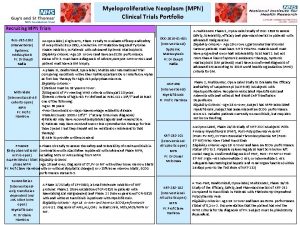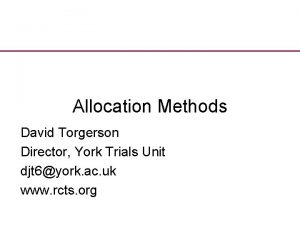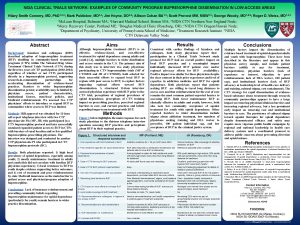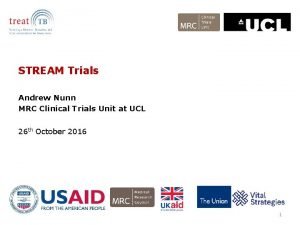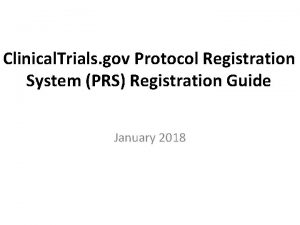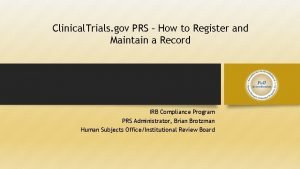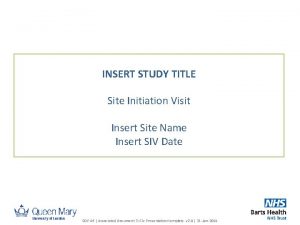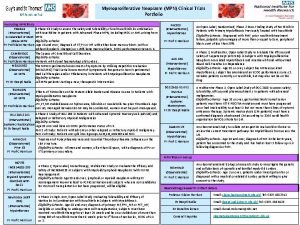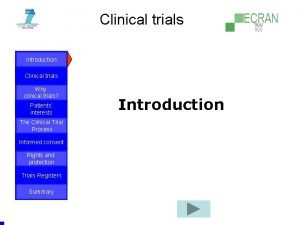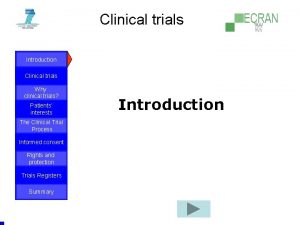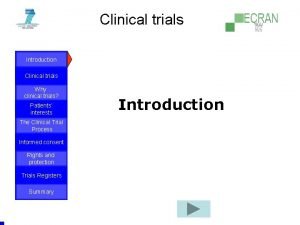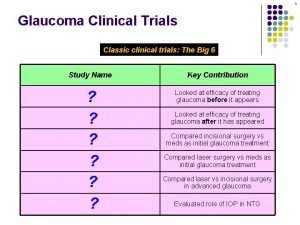PERFUSE Clinical Trial Course Ethics of Clinical Trials















- Slides: 15

PERFUSE Clinical Trial Course Ethics of Clinical Trials I Clara Fitzgerald, MPH

Agenda • Ethics of Clinical Trials Part 1 – Historical Context – Rules of Science – Important Ethical Guidelines – Responsible Conduct of Research & the 7 Principles • Ethics of Clinical Trials Part 2 – Informed consent – Equipoise

Ethics in Clinical Research • Human subject research – systematic investigation that involves the use of human subjects in any capacity • Distinction between clinical research and clinical medicine Clinical Research Clinical Medicine Goal Generate useful & generalizable knowledge Benefit the patient being cared for Method Double blind RCT, dose escalation trials Standard of care, evidence based Risks Risk involved may not be well understood and benefits may not be direct Risk involved are understood and patient stands to benefit directly

Historical Perspective • Nuremberg Trials (1945 -1947) – During WWII Nazi German physicians conducted inhuman and unethical trials and experiments among prisoners in concentration camps • Tuskegee Study of Untreated Syphilis Trial (1932 -1972) – African American men living in Macon County Alabama with latent syphilis were enrolled – Trial aim was to study the disease course of Syphilis – Penicillin recognized as a recommended treatment for syphilis in 1947, the participants did not receive medical treatment

Important Ethical Guidelines 1. The Nuremberg Code (1949) 2. The Declaration of Helsinki (1964) 3. The National Research Act, the “Common Rule” (1974) 4. The Belmont Report (1979) 5. International Conference on Harmonisation (ICH) Guidelines for Good Clinical Practice (1996)

Ethical Framework: 7 Principles • Valuable Scientific question • Valid scientific methodology • Fair subject selection • Favorable risk-benefit evaluation • Independent review • Informed Consent • Respect for enrolled subjects

1. Valuable Scientific Question • Is the question valuable? • Has the question already been answered? • Is this research worth doing?

2. Valid Scientific Methodology • Ethical clinical research should be designed to yield results that are: – Valid – Reliable – Interpretable – Feasible – Generalizable

3. Fair Subject Selection • Scientific objectives should be fair– Inclusion / Exclusion criteria – Recruitment Strategies – Patient selection

4. Favorable Risk-Benefit Ratio • Understand Risk – Define and communicate risk • Minimize Risk – Only including procedures or tests that are absolutely necessary • Define Benefits – Direct and secondary benefits • Maximize Benefits

5. Independent Review • Institutional Review Boards– Ensure ethical requirements have been fulfilled • Risk are justified by the anticipated benefits, if any, to the subject or by the information to be gained from the study • Informed consent is adequate • Risks are minimized

6. Informed Consent • “The voluntary consent of the human subject is absolutely essential” – The Nuremberg Code • Informed Consent – Disclosure of information – Understanding of risk / benefit – Voluntary – Authorization

7. Respect for the enrolled subjects • Ethical requirements do not end at informed consent • Ongoing throughout the study– Monitoring welfare / Interim analysis – Ensuring patient confidentiality – Updating patients with new information – The right to withdrawal – Post study planning

Ethical Framework: 7 Principles • Valuable Scientific question • Valid scientific methodology • Fair subject selection • Favorable risk-benefit evaluation • Independent review • Informed Consent • Respect for enrolled subjects

References and Further Reading • https: //www. wikidoc. org/index. php/Textbook_of_clinical_trials • Emanuel E, Wendler D, Grady C. What makes clinical research ethical? JAMA 200, 283(20): 2701 -11 • The Nuremberg Code. Trials of war criminals before the Nuremberg military tribunals under control council law. 1949. [14/10/13]. http: //nuremberg. law. harvard. edu/php/docs_swi. php? %20 DI=1&text=medical. • World Medical Association. Declaration of Helsinki, 6 th revision. 2008. [14/10/13]. http: //www. wma. net/en/30 publications/10 policies/b 3/ • The Belmont Report. Ethical principles and guidelines for the protection of human subjects of research. Department of Health, Education, and Welfare. , National Commission for the Protection of Human Subjects of Biomedical and Behavioral Research. J Am Coll Dent. 2014 Summer; 81(3): 4 -13. • Jones JH. Bad Blood: The Tuskegee Syphilis Experiment, expanded edn. New York: The Free Press; 1993 [1981] • The Nuremberg Code. Trials of war criminals before the Nuremberg military tribunals under control council law. 1949. [14/10/13]. http: //nuremberg. law. harvard. edu/php/docs_swi. php? %20 DI=1&text=medical. • Howick JH. The Philosophy of Evidence-Based Medicine. London: Wiley-Blackwell; 2011.
 Ohsu clinical trials office
Ohsu clinical trials office Clinical hysteria salem witch trials
Clinical hysteria salem witch trials Mpn clinical trials
Mpn clinical trials York trials unit
York trials unit Nida clinical trial network
Nida clinical trial network Clinical trials quality by design
Clinical trials quality by design Mrc clinical trials unit
Mrc clinical trials unit Prs clinical trials
Prs clinical trials Hawk irb
Hawk irb Site initiation visit agenda
Site initiation visit agenda Mpn clinical trials
Mpn clinical trials Randomization in statistics
Randomization in statistics Clinical trials.gov login
Clinical trials.gov login Clinical trials
Clinical trials Clinical trials.gov api
Clinical trials.gov api Dhl clinical trials
Dhl clinical trials


